Financial Collapse & Solutions in Natural Economy, Decentralization & Community Managed Natural Resources

Sunflower and Bee- image source pixabay
There have been various predictions over the last few days by Financial experts along with Julian Assange and Bix Weir who was recently interviewed on Kerry Lutz's financial podcast. Bix explained that Germany's most powerful bank, Deutsche bank is imploding after a 14 billion dollar fine and noone is going to step in to stop it. The penalty was imposed by the U.S. Justice Department earlier this month for behavior surrounding the subprime mortgage crisis, shares plunged late last week. This emerges around the same time as the US bank Wells Fargo was exposed for fraud charges also. Germany has been the financial strong hold of the European Union. Some say this will lead to a domino effect of financial crisis. Gold Bullion has fallen in value by 3.3 per cent. Precious metal fell 3% to below $1,300 a troy ounce on Tuesday the 4th of October 2016, its biggest daily loss since late 2013, some financial experts point out that Gold has been over valued by 25 per cent, other experts say Berlin will intervene and rescue Deutsche bank. However, many of us are tired of banks, bankers and their corrupt ways with stock market manipulations. Deutsche bank is the largest derivative holder in the world, and the stock market is at its highest values ever, are we seeing the first serious signs of the internal financial institutions and their empires starting to crumble?
Solutions After the Crash
Amidst this economic crisis that all of us are feeling the pinch of the world over, perhaps such financial collapse would yield great opportunities to wipe the slate clean. It would represent the end of the archaic and environmentally destructive power structures and power would shift to local communities setting up new infrastractures that are self sustaining, with alternative entrepreneurs focusing on other forms of currency like cryptocurrency and creating a foundation for a more sustainable and ecological economy, this is great news for Investors in Steemit, Bitcoin and other Cryptocurrencies.
However, in the rare case that the internet is blacked out globally, which has been alluded to by various sources as a possible scenario while the US government seeks to control the internet. We also need to look at other ways we can use this as an opportunity to safeguard Nature and Natural Resources, while the Earth is currently being destroyed because Corporations have politicians and Environmental Laws in their pockets, we could use this economic and ecological crisis to restructure a more sustainable economy to safeguard the future of Nature's bank and natural resources.
The word ‘economy’ comes from the Greek rooted word Oikos (Ecology), Eco and nomy meaning distribution or management, money, the economy was only ever supposed to be within the boundaries of nature's resources. Eco-nomy is defined by how communities of people choose to use to manage and harness their local and global environmental resources to meet their chosen living requirements, therefore economy, should have always been based on ecological principles to begin with. Human life depends on goods and services provided by nature, therefore, it is our duty to manage what we utilise from Earth sustainably, if we want to keep the Earth Bank sustainable, we must invest in its future and its present invisible production of goods and services. We can explore innovative strategies to transfer an entire economy built on principles within the Earth's ecological carrying capacity, (within the limitations of the Earth's natural resources).
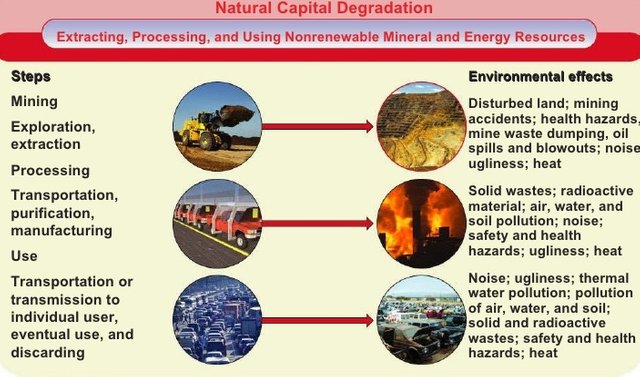
diagram courtesy of wikicommons media, for reuse.
When our current economy is based on oil, this can only mean ecological destruction, as it is the only way to gain profit and improve the economy as it is, if we transferred our economy from this destructive pattern, to be based on ecological values in terms of financial capital, we would not only secure life on Earth to prosper but our economy will be sustainable and evolve in unexpected ways. Most of the world believes that oil comes from fossil fuels and is in limited supply which allows oil prices to soar in the USA, destabilising the economy and there are those that believe oil to come from abiotic sources. With this dichotomy aside, we still have too many roads and cars and although we have the technology for alternative fuels and energies, (which are investigated in my earlier articles), the Oil-garchs will not lessen their grip from oil, which is causing much of the global ecocidal destruction.
Humanity is evolving faster than the capitilist machine that it has been dependant on, therefore, in order to survive economic and environmental changes, we must take responsibility of ourselves to create a new sustainable system to support our evolving consciousness and local communities if we are to continue to survive, which reminds me of Albert Einstein's quote "Feeling and longing are the motive forces behind all human endeavor and human creations".
We will look at several ecological economists and pioneering models to examine frameworks of their concepts and how they can be applied to intergrate economy into being more friendly to the environment and protecting nature rather than exploiting nature.
The economist Frank Rotering is a leading thinker in revolutionizing our economy. Frank has some realistic and grounded ideas for solutions to our economic and ecological crisis. These solutions, if implemented could help assist with an overdue transition from the subjective capitalistic economy to an ecological economy. An ecological economy that is objectively conscious of our limitations of the earths natural resources. In ecological terms, this is the environmental carrying capacity, every species has a limited environmental carrying capacity in relation to population growth. A self sustaining economy that adheres to human well-being and ecological sustainability, taking this into account, Frank Rotering has coined the phrase Needs & Limits.
Rotering has constructive solutions and positive insights into where the economy could 'evolve organically' during this shift, he does not dismiss the human need for markets, markets are essential to human society and economic growth. Rotering does provide constructive solutions to where capitalism is too subjective and exploitative to humanity and the environment. Many other modern economists fail to provide necessary constructive solutions for such a transition.
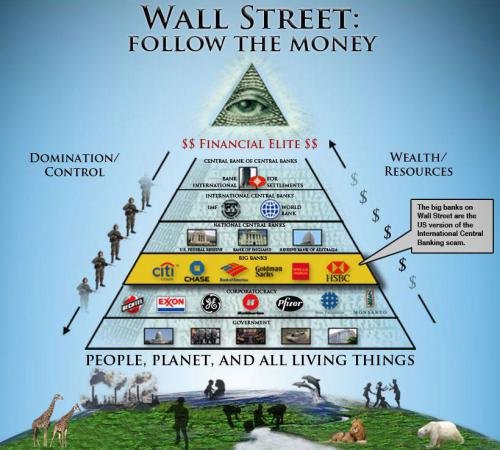
Diagram from píxabay for reuse.
The theories on ''overpopulation'' are more complex than Rotering's ideas on what he thinks is a population problem. From a deep ecological perspective, a population of 7 billion people would not be a 'problem', if the tools for each family to live sustainably were accessible to everyone, solar power, permaculture techniques, water collection and generation, alternative energy infrastructures all set in place in every community across the planet.
The concept that overpopulation is driving environmental destruction is incorrect, more than half the world live very simply on less than a dollar a day and live in poor rural areas; it is the 1 percent of the global elite that control the world's resources who are destroying the natural biodiversity of the planet and driving ecocide, as they control the largest corporations which inturn have bought out politicians to weaken environmental laws, so they can plough away at our last natural wildernesses and forests.
We can daydream for a moment and imagined that the 1 percent elite families have lost control of the banking, food, water and energy systems and a shift in power will take place back to local communities who have reclaimed their rights to take care of their own local land, food and water supplies. If everyone had even half an acre to live on and grow food on, we all would be able to eat and new blueprints to ecologically economic societies would be birthed with the aim of more balanced economic sustainable structures, such as implimenting an economy structure based on some of Rotering's solutions. We have to understand that the current oil based economy must be changed to an economy based on more sustainable energy resources for transport and domestic and industrial energy supplies, because our dependence on oil is causing ecocide, this has been explored in earlier entries of this blog.
We agree that Western society must live more within our ecologically realistic limitations, consume less and live more sustainably. We agree that predatory capitalism equals exploitation, and thrives from growing centralized power structures. This is part of its subjective characteristics and results in a few countries having more power, wealth and opportunities than the rest of the world, which is the cancer of this growing disparity between the first world nations and ''third world nations'', which were originally ancient first world superpowers in the story of ancient history.
Here we provide further steps towards sustainability and increasing power to local communities:
1. Decentralisation of power in cities and governments, to smaller towns and villages, for local communities to have more say in governance of local resources instead of governments.
2. Increased self sustainable towns and cities, strengthening local infrastructures for alternative fuel systems and alternative energy resources for off the grid power generators.
3. Ideally, the governments that currently have central power would return the rights for developing countries the access to manage their own land and natural resources which would remedy starvation put a stop to corporate land grabs and create a more sustainably balanced structure that is not centralised in the Western World.
4. Abolish "third world debt" based on unrealistic inflation agendas for the world powers to control natural resources in 'poorer' foreign countries that are actually 'richer' in rare minerals and natural resources than most Western countries, we will see how in further paragraphs the Natural Economy in terms of goods and services and biodiversity, can turn the poorest nations into the richest over night and would be used to wipe world debt.
5. Western corporations need to abolish privatisation of water, and land resources in "third world countries".
6. Return land rights to rural community agriculturalists in developing countries, and locally supporting sustainable agriculture. With localised sustainable farming there would be an equal distribution of food and grain and where there is poor soil quality implimentation of soil restoration projects .
7. Abolish fishing and farming to giant corporations outside localized catchment areas; as is currently the activity of Western countries to over-fish and over-farm in catchment waters belonging to developing countries, robbing them of their own valuable resources to feed their starving populations.
The current global cracks we see emerging in both the ecological and economic crisis, is a sign that we need to re-evaluate an economy that has been built on short-term gain and with no acknowledgement or regard for nature’s capital, invisible goods, services and production that everyone takes for granted. This complete disregard to nature’s capital is so engrained in our perception of the world, we don't think twice about our wasteful consumerist culture. We could start exploring new ways of seeing nature as an investment to preserve biodiversity and the natural balance of ecosystems for the future of humanity.
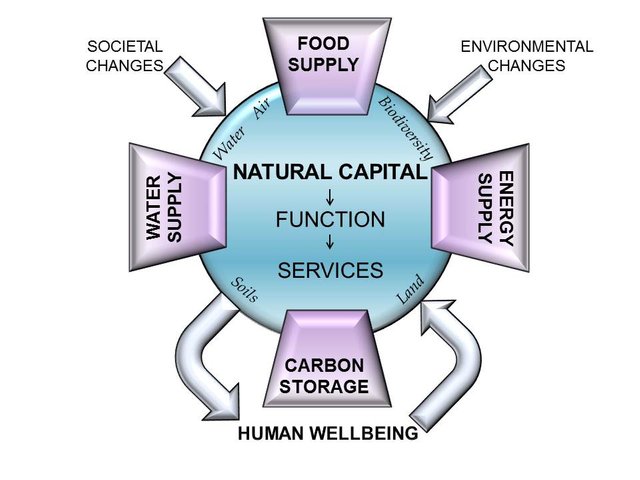
Diagram for reuse from wikicommons media.
Every living species of plant and animal and ecosystem has an important role in nature’s bio-production which has an important financial value in Natural Capital. This is a very exciting concept that could revolutionize, reshape and immediately shift a destructive debt ridden oil-based economy to an entirely sustainable and wealthy one. However, just like other similar solutions to humanities problems, it may be difficult to implement an economy based on Natural Capital, as it may pose as a threat and may not be adopted by the elite 1 percent, whom wish to maintain their power and control over centralized management of the world’s natural resources and maintaining world debt is one way the banking families do this.
Perhaps a global financial crisis will allow a shift in power to a more community orientated one if local councils and communities adopted the 'Commons' philosophy and locally took control of managing local land and natural resources during times of crisis. The most powerful companies in the oil, chemical and biopharmaceutical industries also would have to pay the largest costs for environmental damage to natural capital, through negligence of Corporate Social Responsibility (CSR), to the environment and severe damage to ecosystems, local communities would be able to sue all corporations for environmental litigation purposes and compensation. If local communities were returned their powers to manage local landbased resources and the local environment, corporations would have far less power and protection priviledges. ‘The Green Economy Initiative’ of the United Nations Environment Programme, (UNEP) and other efforts underway to improve the way in which we value and account for nature in our economic decision-making show that these systems can work, however, instead of allowing governments to manage green economy systems, we the people in our communities can create our own blueprints for a new foundation for switching to a community powered rather than UN powered ecological economy. Lets move away from governance with power to people and power to communities communities campaigining to put emphasis on more sustainable infrastructures in local management and value on local ecosystems and natural capital.
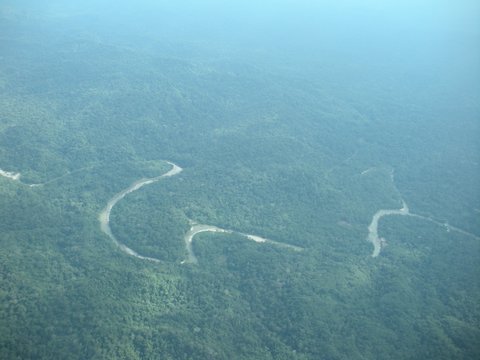
Photo by Carlita Shaw. Author's own copyright, 2012. The above photo I took on a flight deep into the Ecuadorian Amazon rain forest, where beneficial goods & services for 20 per cent of the world's oxygen, provides climate balance, 50 per cent of the world's biodiversity, more than half the world's medicines, foods, minerals, fish habitats, 20 per cent of the world's fresh water, and valuable carbon sequestering source.
Other recent initiatives, such as the global study on ‘The Economics of Ecosystems and Biodiversity’ (TEEB), has resulted in a better understanding of the economic value of forests and other ecosystems for societies, as an example. The TEEB study estimates that the world’s national parks and protected areas generate wealth via nature-based goods and services equal to around US $5 trillion per year in terms of biodiversity value. Ecosystems provide us with services and goods such as food, clean air and water, while forests provide protection from soil erosion, clean air, recreational services, medicinal products, and climate regulation.
The World Resource Institute (WRI) estimates the value of ecosystem services to be US $33 trillion a year, nearly twice the value of the global gross national product (GNP) of US $18 trillion. The US is also in debt by 17 trillion dollars, if the US switched to an economy based on natural capital, the financial value tied up in its natural capital would take care of this debt. In the same way that a banknote is a promissory note against the gold or silver that has been deposited in the bank, ecological economists are seeing how we can start to put the same value onto ecosystems and the role of species in ecosystem production; another example would be the 80 percent of oxygen generated by algae and microbial activity in the oceans. Hypothetically, the value of the work done in existing ecosystems could regenerate local economies and increase the wealth and monetary value of nature globally, simply by ensuring its conservation and existence by using initiatives similar to the TEEB Economic of Ecosystems and Biodiversity model if we took it to a community level to decentralize govenmental powers and management of our natural resources.
Nature’s ecological banking system could be a way to revolutionise our world and local economies and transfer wealth from an oil-based economy to an ecology-based economy, this wealth would provide poor countries with enough ecological economy that global debt would become a thing of the past. This starts on a local level, worldwide, which would regenerate and allow local communities to have better control over their own natural resources, protecting and managing them from over-exploitation of previously decentralised management of resources, which could be prevented, if corporate social responsibility pays a tax to the natural capital destroyed and when more is taken out of the ecosystems and Natural Capital, than is put into them, this crucially needs to be taken into account in order to gain more balance.
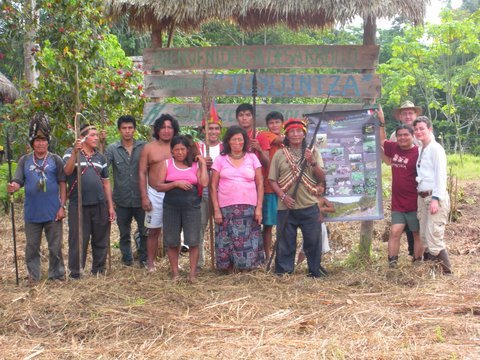
The Shiwiar community, Ecuador, 2012. Photo copyright of C.Shaw (author).
This form of converting nature into capital would boost and stabilize the world economy, as well as give more strength to local economies on so many levels; it would also provide millions of new jobs and professions for ecological accountants, auditors and bookkeepers. Pavan Sukhdev was involved in setting up the TEEB initiative and he says that "the stuff of life is natural capital", he proposed putting a value on natural capital in order to ensure its conservation, he says that there is an abundance of unclaimed financial goods in ecosystem services that would breathe life into the poorest communities, they are important benefits of public wealth, and it is usually the poorest people that manage these ecosystems. Another new concept in ecological economy is the Payment for Ecosystem Services (PES) which are agreements whereby a user of an ecosystem service makes a payment to an individual or the communities managing the land and natural resources where those goods and services are generated, in such scenarios, croporations or individuals whose practices such as land use, mining or deforestation directly affects the use of that ecosystem services which have to be paid for immediately, encouraging more care to be taken during extraction processes and stronger environmental laws set out by the local communities give more power to the people, as in such cases of indigenous people who previously have had their ancestral land taken from them with no regards to their rights by powerful corporations, in this way Payment for Ecoystem Services would provide more power to the local people that live in the vicintity of the land, that are its natural caretakeers so that corporations would loose all powers to make decisions on land management and communities would have all the decision making powers.
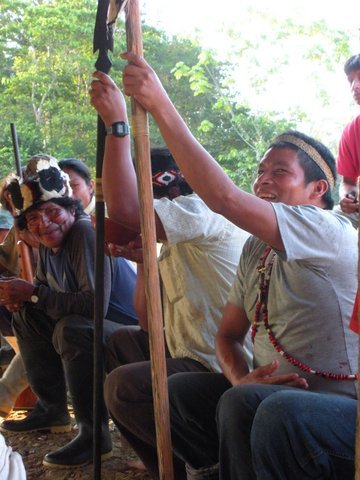
The Shiwiar community, Ecuador, 2012. Photo copyright of C.Shaw (author).
Pavan, points out that when we measure our GDP, we don’t include our biggest assets at the country level at the local level, which would be the Natural Capital of each community in that country. When we measure Corporate Social Responsibility we do not consider our impacts or costs on nature, or human health or society, and that needs to stop, ‘You cannot manage what you do not measure” - Pavan Sukhdev.
A community at a local geographic level, as well as at a global level, has the power to change the direction of humanity, so perhaps while governments continue to ignore botht he financial and environmental crisis, we in our local communities can start taking action to change things at this level, and we can start considerng Nature Capital initiatives on local community levels, perhaps people could pool in their land resources to be used as local biodiversity assets, goods and services, farmers would gain far more support from local communities and land would be seen in an entirely new way and looked after more carefully.
Sustainability empowers the planet and people; this is the only route for humanity to take, if it is to stop species extinction and to have a chance of survival. We have to invest in sustainability by also investing more in conservation of our land, by preserving wildernesses and forests and designing an alternative ecological economy based on some of the concepts looked at in this article, an entirely new economy built on the principles within the Earth's natural carrying capacity, which means that individuals on a community level make economic decisions according to the limitations of our ecological natural resources, within the limits of the Earth's natural carrying capacity. This would be an investment in both nature and ourselves. If only governments would invest in conserving natural resources and wildlife conservation as they do in the world banking systems, after all, Planet Earth is the only world bank supporting human life as well as all other life on the planet, only when we begin to see this, will things change, when the value of all life on Earth is seen as a valued ecological asset that helps keep the planet functioning in balance. While these important ecological values are being ignored, species extinction and ecocide will continue till we have no choices left.
There is still a seed of hope for a shift in human consciousness from a political-economic pyramid structure to a more sustainable equal or holographic way of operating politically, socially and economically through improved transparency in governments and financial institutions and transferring centralized power structures to local communities for an ecologically sustainable economy, where all humans have an equal chance at wealth and quality of life. An ecological economy would allow more people to see and value nature and ecosystems, let alone, how we are interconnected to all life on Earth. There is a great resistance for this to take place at government levels, as the addiction to power drives a great fear of the loss of power, which is also why alternative cleaner energies have been avoided, therefore we are being made to persist in this state of doomed atrophy on all levels of reality.
The seeds of hope are within every one of us. We can all possibly help contribute to solutions for this crisis; it takes those of us that are courageous enough to implement these changes. Putting financial value on Natural Capital is a ‘Commons’ concept which would allow communities to locally maintain and manage natural capital and resources locally, which would also be a regenerative concept for natural economy. “a dilemma in which multiple individuals acting independently in their own self-interest can ultimately destroy a shared resource even where it is clear that it is not in anyone’s long-term interest for this to happen’’ – Hardin. 1968 on The Tragedy of the Commons.
By Carlita Shaw
Author & Ecologist
The Silent Ecocide- A crisis of human consciousness
https://www.amazon.com/Silent-Ecocide-Environmental-Crisis-Consciousness/dp/1512365718
Further Research
Financial Survival Network
http://financialsurvivalnetwork.com/2016/09/bix-weir-final-collapse-is-happening-now/
What happened on the stockmarket today?
http://www.fool.com/investing/2016/10/04/what-happened-in-the-stock-market-today.aspx
Frank Rotering's website and work
http://nomoreillusions.org/list-of-documents/
What is Ecological Economics?http://www.uvm.edu/~jfarley/EEseminar/readings/What%2Evolution of Ecological Economics
http://steadystate.org/wp-content/uploads/Czech_Ecological_Economics.pdf
Ecological economics vs. conventional economics http://sustainablepath.org/wp-content/uploads/2008/11/what-is-ecological-economics-one-pag-pdf-080123.pdfhttp://www.unep.org/greeneconomy/ TEEB Initiative Report available online.
Pavan Sukhdev- Ted Talks Put a Value on Nature
The Tragedy of the Commons. Published in Science. De Young, R (1999) Tragedy of the Commons. In D. E. Alexander & R. W. Fairbridge [Eds] Encyclopaedia of Environmental Science. (Pp. 601-602) Hingham, MA: Kluwer Academic Publishers.
Nice writeup! I post similar topics. Following and upvoted!
great I will follow ye back thank you!
What an incredibly uplifting piece @carlitashaw! Thank you so much for all the time and energy you put into your writing, focussing on Solutions instead of all our well known problems. I am excited to share this on fb, so many of my friends need to hear these brilliant solutions. I talk a lot about decentralization of Life, you hammered the points home with great examples. Rebloggged as well. I'm honoured to have met you.
awwww thank you Lyndsay, its unfortunately that my work goes missed mostly here, I don't quite get Steemit and its voting system but its comments like this that make it all the more worth while thank you for caring about Earth and solutions, there are not many of us.
This is great material! Don't let the lack of upvotes stop your contribution to this community. It is in its infancy and needs contributors like you.
thank you andre, I really appreciate the encouragement!
Great work! I too believe that decentralization is the solution to our dilemma.
I would like to point out that the US just handed control of the internet to the UN which is just as scary. Decentralization is what the internet is built on so we need to overcome there too. I would also like to suggest that we quit giving the global controllers that positive feed back of calling them elite.
They are more a parasite on the planet and the people.
I think these parasites are trying to crash this current system and replace it. This is our opportunity to replace it with our own ideas.
wow that is scary about the UN controlling the internet, but not unpredictable hey as we see what kind of agenda is unfolding. And I agree they are not elite, they are definitely parasitic entities in every sense of the word!